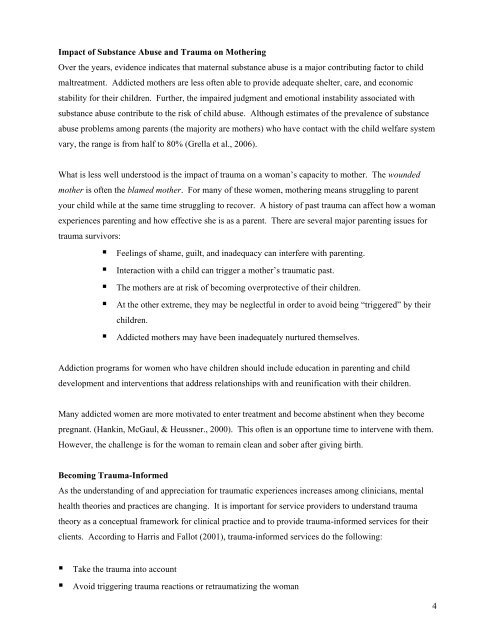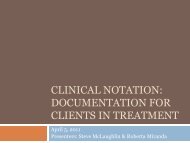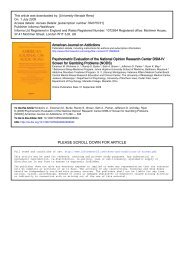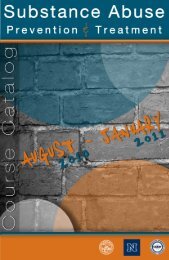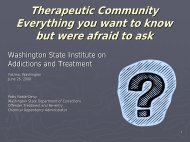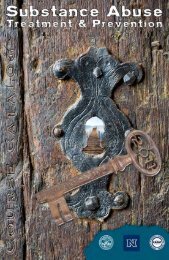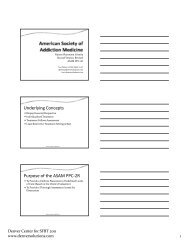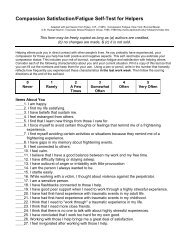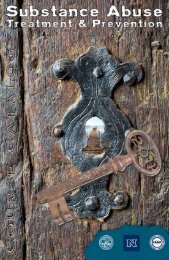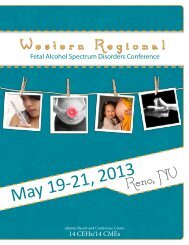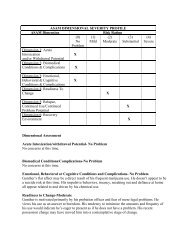Working with Substance Abusing Mothers: A Trauma ... - CASAT
Working with Substance Abusing Mothers: A Trauma ... - CASAT
Working with Substance Abusing Mothers: A Trauma ... - CASAT
Create successful ePaper yourself
Turn your PDF publications into a flip-book with our unique Google optimized e-Paper software.
Impact of <strong>Substance</strong> Abuse and <strong>Trauma</strong> on Mothering<br />
Over the years, evidence indicates that maternal substance abuse is a major contributing factor to child<br />
maltreatment. Addicted mothers are less often able to provide adequate shelter, care, and economic<br />
stability for their children. Further, the impaired judgment and emotional instability associated <strong>with</strong><br />
substance abuse contribute to the risk of child abuse. Although estimates of the prevalence of substance<br />
abuse problems among parents (the majority are mothers) who have contact <strong>with</strong> the child welfare system<br />
vary, the range is from half to 80% (Grella et al., 2006).<br />
What is less well understood is the impact of trauma on a woman’s capacity to mother. The wounded<br />
mother is often the blamed mother. For many of these women, mothering means struggling to parent<br />
your child while at the same time struggling to recover. A history of past trauma can affect how a woman<br />
experiences parenting and how effective she is as a parent. There are several major parenting issues for<br />
trauma survivors:<br />
• Feelings of shame, guilt, and inadequacy can interfere <strong>with</strong> parenting.<br />
• Interaction <strong>with</strong> a child can trigger a mother’s traumatic past.<br />
• The mothers are at risk of becoming overprotective of their children.<br />
• At the other extreme, they may be neglectful in order to avoid being “triggered” by their<br />
children.<br />
• Addicted mothers may have been inadequately nurtured themselves.<br />
Addiction programs for women who have children should include education in parenting and child<br />
development and interventions that address relationships <strong>with</strong> and reunification <strong>with</strong> their children.<br />
Many addicted women are more motivated to enter treatment and become abstinent when they become<br />
pregnant. (Hankin, McGaul, & Heussner., 2000). This often is an opportune time to intervene <strong>with</strong> them.<br />
However, the challenge is for the woman to remain clean and sober after giving birth.<br />
Becoming <strong>Trauma</strong>-Informed<br />
As the understanding of and appreciation for traumatic experiences increases among clinicians, mental<br />
health theories and practices are changing. It is important for service providers to understand trauma<br />
theory as a conceptual framework for clinical practice and to provide trauma-informed services for their<br />
clients. According to Harris and Fallot (2001), trauma-informed services do the following:<br />
• Take the trauma into account<br />
• Avoid triggering trauma reactions or retraumatizing the woman<br />
4


